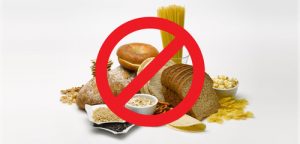Does too much gluten make us fat?
 In fact, gluten is not only present in those cereals that have it in nature , such as wheat or barley, and therefore in the products derived from the flours of these cereals, such as bread, biscuits, pizzas. , pasta. Those who suffer from celiac disease, or have an intolerance to gluten, know that there is something called ” hidden gluten “: that is, percentages of gluten present in industrial products as thickeners that are massively part of our daily life.
In fact, gluten is not only present in those cereals that have it in nature , such as wheat or barley, and therefore in the products derived from the flours of these cereals, such as bread, biscuits, pizzas. , pasta. Those who suffer from celiac disease, or have an intolerance to gluten, know that there is something called ” hidden gluten “: that is, percentages of gluten present in industrial products as thickeners that are massively part of our daily life.
First of all, a premise : I’m not for the gluten-free trend. The gluten-free diet is for celiacs, the gluten-free trend does not lead to health and weight loss benefitsfor those who normally tolerate gluten, but it is a business behind which hides a new range of industrial and expensive products that often have more flaws than traditional ones. For example, rice or corn pasta, with a high glycemic index, and many sweets and treats that compensate for the lack of gluten with a higher load of sugars, thickening gums and flavor enhancers, or a higher percentage of fat (always for their unifying power). Yet, having made this premise, it is also true that too much gluten makes our intestines lazy, creates abdominal swelling, makes digestion more difficult and can cause us what in English is called ” gluten sensitiveness “, or sensitivity to gluten.
Just because something isn’t easy to prove doesn’t mean everyone complaining about a gluten problem is necessarily lying . That the food industry swells many products with gluten is the pure truth: you can find gluten hidden in soups and minestrone, vegetable purees, even frozen, freeze-dried, canned, canned foods, sauces and gravies. And again: minced meat, ready-made meatballs and hamburgers of various types, omelettes, various fillings, wurstel, pressed meat, preparations with breading, fried, etc. Much of what we buy has gluten added, even drinks.Not only that: the same wheat has undergone an increase in glutinosity in recent years. All this extra gluten, the hidden gluten, we ingest it in much greater doses than our grandparents and parents.
What can we do? To avoid eating too much gluten, we avoid most ready-made foods, and alternate the various cereals with the consumption of normal pasta (yes, of course, even those with gluten), as long as they are whole. These cereals have not undergone the same modification as wheat, and the food variety would lead us to have fewer digestive and intestinal problems which also affect our weight.
In short: without alarmism and without necessarily relying on an expensive and useless gluten-free diet if you are not celiac, it is useful, however, to make these considerations on what we bring to the table, enriched with gluten in a way that could hurt us .





























+ There are no comments
Add yours